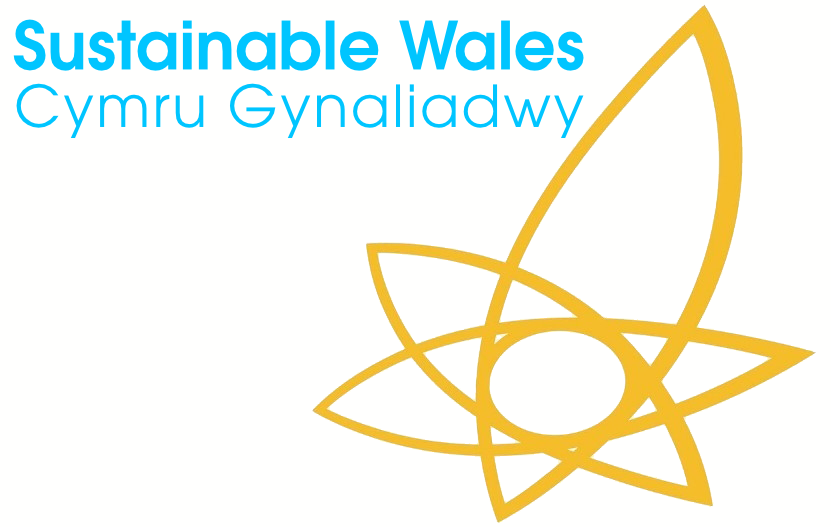Manifestos Scores by FoE
Read MoreA selection of manifesto reviews in regard of the May Elections 2021
Wales May Election 2021 - A Selection of Manifesto Reviews (Sustainable Wales do not necessarily endorse all comments below).
Recommendations from Future Generations Office,
www.futuregenerations.wales/wp-content/uploads/2020/10/Manifesto-for-the-Future-FGCW1.pdf
Review of political parties manifestos for small business sector
The Roots to a Green Recovery in Wales - Woodland Trust
https://www.woodlandtrust.org.uk/publications/2021/03/2021-welsh-parliament-election-manifesto/
WWF Cymru Manifesto for 2021
https://manifesto.wwf.org.uk/wale
FOE Cymru score all the parties manifestos out of 10
https://www.foe.cymru/news/party-manifestos-assessment
RSPB Wales Manifesto/May2021
Keep Wales Tidy Manifesto 2021 - 2025
https://www.keepwalestidy.cymru/Pages/FAQs/Category/our-manifesto
Food Policy Alliance Wales
https://www.foodsensewales.org.uk/pdf/FPACManifestoEnglish_091120.pdf
Centre for Constitutional Reform.https://www.centreonconstitutionalchange.ac.uk/news-and-opinion/what-about-wales-wales-manifesto-review
An Anti-Racist Waleshttps://c3sc.org.uk/wp-content/uploads/From-Rhetoric-to-Reality-Our-Manifesto-for-an-Anti-Racist-Wales-Race-Alliance-Wales.pdf
Electoral Reform Societyhttps://www.electoral-reform.org.uk/ers-cymrus-2021-manifesto-for-democracy/
Three Things... books - politics - walking by Kristian Evans
three things…
books - politics - walking
Books. He’s got too many books. There are well over a thousand volumes of poetry, philosophy, history, ecology and so on and on crowding every available space here and even colonising spaces that should be kept clear – the stairs, tables, kitchen cupboards, chairs, windowsills – all are crowded over with stacked books. The Táin Bó Cúailinge is in a pie dish and Henri Michaux is in the herb rack. Most of the books just sit there, waiting, gathering dust. Katharine Briggs' fairy survey is rescued from the coal bucket. A large number have yet to be read. Some follow him daily from room to room like permanent dreams.
Should he get rid of a few of these old tomes? Impossible; they are all valuable and deeply necessary and who knows? We might need every particular page one day. For example, here is a book on the uses of conscience in the poetry of George Herbert and Thomas Vaughan. It is a beautifully made object, and thoughtfully written, years of work, and altogether an unfailingly interesting thing to consider. How could he possibly get rid of it? When he puts it back on the shelf it might well stay there until he is dead. Yet Herbert and Vaughan were profound and humane and wrote at a time of great social upheaval, not unlike our own. We can learn from them. The same applies to so many of these books. The poetry of Iolo Goch, anyone? What use can we find for a localised theurgy in the philosophy of Iamblichus? Or essays on the bioregional imagination in Canada? Ah, look, a study of the evolution of the roundhouse in bronze age Britain, hidden under a memoir of a life obsessed with red foxes.
Some people live in cosy, snug, comfortable hutches, homely and organised. Alas, we have to conclude that this man shelters in a library. Yes, one of the most important functions of these four heavy old walls, this house, is that it’s a place to store books. The hour is getting late, it’s dark outside, you’ll have to balance your wine glass on the shoulder of a ghost, but at least we are keeping a candle or two lit for learning, here in the library, lodged like a chilly monastery among the shifting dunes on this faraway edge of Glamorganshire coast.
Politics. “I shall be involved in politics…saved!” So wrote the great French poet and heretic Arthur Rimbaud in his savagely self-critical testament, ‘A Season in Hell’. Once, long ago, a sane human might have hoped to live adrift from the concerns of politics, quietly cultivate the garden, raise children and write songs maybe, and laugh at the wild boar snuffling in the orchard. Now though, politics has come for us all, and will not leave us alone. We are all utterly involved, and there is no escape. Time, we discover, is not running out; it is speeding up. Power and the performance of power insist on dancing upon our attention, attempting to entrance and ensnare us with visions of salvation that are of no profit to anyone but warmongers and vampires. You must play the game. You really must. The only way out is through. Because none of us has a sure grip on reality any more. And how can you possibly hope to grow anything in your garden, or raise the next generation, as the world dissolves and disappears all around you? And you there, yes, you also are fading away, gone as the lapwings are gone, and a thousand other species are gone, leaving what else to the future but silence?
Walking. We follow the dog, a lively affectionate collie, along the dried out dune slacks to the ruined haul road, and on to the vast empty miles of beach. A desolate place at the best of times but we love it and come here as often as we can. We struggle into the rippling gale and shout nonsense words to each other and to the grinning dog and then wander on to find shelter in the lee scoop of a pile of driftwood and ripped nets and dolphin bones and shards of plastic jumble. Quieter now, we eat our sandwiches and crisps. I like pouring the tea, strong and sweet, hot and steaming from the old black flask. Sal, the collie, dances in breathless, nuzzles at us, looking for a cwtsh or a crust or a chuckle, then rushes off again scattering sand and ozone to chase an oystercatcher or a gull, or to sniff at the old wrecked cargo boat exposed by the tide. My son cuts a bit of good rope free from a half-burned tangle of junk to keep for later. “You’ll ruin the knife edge” I grumble, but I’m glad he has a scavenger’s instincts. I waste three matches to light my cigar, huddling deeper under the snapped chunk of a twisted old ash tree, and watch the blue smoke flow as it settles my mind.
We talk about school, and sport, and wild animals. I tease him by quoting poetry – the wind flung a magpie away and a black backed gull bent like an iron bar…slowly – he pretends he thinks this is rubbish, but I know he is intrigued. He teaches me Welsh words I have forgotten, or never knew -- pioden y môr? – and the hours go by and we’ve done nothing difficult and soon the late September sun is leaning into the sea. Rain clouds are clotting over Gower and advancing across the bay towards the steelworks, hauled and hurried by the west wind towards Sker point and Porthcawl.
We pour one more quick tea, then call the invincible collie in from the waves, and set off again on the rough trek across the restless dunes, along the slacks, leaving our bootprints among the goat willows and birches, hastening from the rain and the wind to get back to the warmth of the cluttered old library where we live.
by Kristian Evans
Kristian Evans is an artist and writer from Bridgend interested in ecology and the ways we think about and interact with the “other-than-human” world. Unleaving published by Happenstance Press.
Also by Kristian Evans on this site:
Response by Madeleine Moon, Bridgend MP over TTIP amendment vote
Original query to MP:
I urge you to support the ‘TTIP amendment’ which I understand is being tabled to the Queen’s Speech. I thoroughly disagree with the Government’s support of the EU-US deal (known as TTIP), and this is one of the very few opportunities which parliament will have to formally challenge this trade deal.
TTIP is a real threat to our public services, our food and environmental standards, and our democratic system. Although I oppose TTIP entirely, this amendment would at least ensure some protection to the NHS. And it sends a powerful message to the government on TTIP as a whole.
I would be grateful if you would respond to me to tell me how you plan to vote.
Madeleine Moon MP voting records
Madeleine Moon is the Labour MP for Bridgend. (Profile)
Response:
From: "MOON, Madeleine" <madeleine.moon.mp@parliament.uk>
Subject: RE: Please support the ‘TTIP amendment’
Date: 1 June 2016 12:42:23 BST
To: "mm@sustainablewales.org.uk"
Dear Ms Minhinnick,
Thank you for your letter. The central purpose of TTIP is to remove trade barriers between the EU and the US. It is regarded by proponents, along with the UK’s continued membership of the EU and NATO and the retention of an independent nuclear deterrent, as an essential component of the UK’s future defence and economic security. It has been suggested that the rejection of TTIP would fragment European-US relations and would thereby assist the strategic objectives of the Putin regime in Russia. It has even been suggested by defence analysts that the Russian Government has provided assistance to organisations protesting against TTIP.
Nevertheless, many fear that the deal will have unintended consequences and could open up our public services, particularly the NHS, to acquisitions by US companies. As you know, Michael Bowsher QC, the former chair of the EU law committee of the Bar, has recommended that the UK Government push for a provision excluding the NHS from TTIP. In a recent letter to Lord Livingston, the European Trade Commissioner, Cecilia Malmström, sought to address and allay these concerns: https://www.gov.uk/government/uploads/system/uploads/attachment_data/file/398608/Letter_to_Lord_Livingston_from_Cecilia_Malmstr_m_NHS_TTIP.pdf. She states that under the deal:
Member States do not have to open public health services to competition from private providers, nor do they have to outsource services to private providers; Member States are free to change their policies and bring back outsourced services back into the public sector whenever they choose to do so, in a manner respecting property rights (which in any event are protected under UK law); It makes no difference whether a Member State already allows some services to be outsourced to private providers, or not.
Until government provides details of how the ‘Investor-State Dispute Settlement’ (ISDS) will work in TTIP, however, the deal’s critics will remain unconvinced. Under this mechanism private investors will potentially have the right to sue the UK government for introducing any regulation that could potentially damage the corporation’s investment or future profits. Supporters of the deal, such as the Labour MP John Spellar, doubt the likelihood an ISDS being used to challenge government policy or to open up public services to private investment. They point to the fact that under pre-existing trade deals, the government has only been subject to an ISDS on two occasions. During a recent debate, Helen Goodman MP responded to this point by suggesting that her concerns are ‘not about the number of court cases taken; it is about ministerial action being inhibited for fear of those court cases’. By exposing the government to the threat of lawsuits by litigious US companies, this provision could prevent or dissuade the government from responsibly regulating the UK economy. It was for this reason that MPs on the BIS Commons Select Committee recently criticised the government’s uncritical support for TTIP: http://www.theguardian.com/business/2015/mar/25/mps-denounce-government-ttip-plans.
Critics who argue that TTIP will increase the power of international corporations to circumvent UK government regulations are worried about its consequences for climate change and the green energy industry. One of the key objectives of European negotiators is to have the US ban on oil exports repealed. As well as increasing the transatlantic trade in oil, a repeal would also facilitate the export of Canadian-mined sand and tar to the EU. The greenhouse gasses emitted in the extraction of these substances is thought to be 23 percent high than the average fuels used in the EU. The import of cheap oil and natural gas extracted through ‘fracking’ could also undermine the production of renewable energies in the EU and UK.
There have also been concerns about the secretive manner in which the deal has been negotiated. The recent attempts of the American car industry to cover-up the safety standards report so as not to deter European policy-makers from signing up to TTIP, have undermined the credibility of the deal. The automotive industry will profit more than any other from TTIP and critics are concerned that these predatory business practices may become established in the UK.
TTIP has the potential to benefit the UK economy. Britain is a trading nation and balanced trade deals have a positive impact on jobs and growth. The government and EU trade negotiators must therefore respond constructively to critics of TTIP and arrive at a deal that benefits workers, consumers and public-service users.
I was unable to vote on the TTIP Amendment in the Queen's Speech. Because I was 'paired' with a Tory MP who had suddenly fallen very ill, my absence did not affect the outcome of the vote.
Yours sincerely,
Madeleine
Listen to the Election Hustings Meeting in Porthcawl - Bridgend constituency
Candidates and representatives in the Bridgend constituency face questions from a lively audience in Porthcawl. This grassroots "Question Time" was organised by Sustainable Wales, ahead of the Welsh Assembly Government elections in May 2016. Chaired by Richard Thomas, Chair of Sustainable Wales. Present were candidates and representatives from all the main parties in front of an engaged and numerous audience. Thanks to the YMCA Y Centre in Porthcawl that hosted the event.
On the panel:
Green - Charlotte Barlow
Liberal Democrat - Jonathan Pratt
Conservative - George Jabbour
UKIP - Caroline Jones
Labour - Huw Irranca-Davies (for Carwyn Jones)
Plaid Cymru - James Radcliffe
Listen to the audio recording here (this can also be downloaded from SoundCloud).
Also available are our Green Room Podcasts.
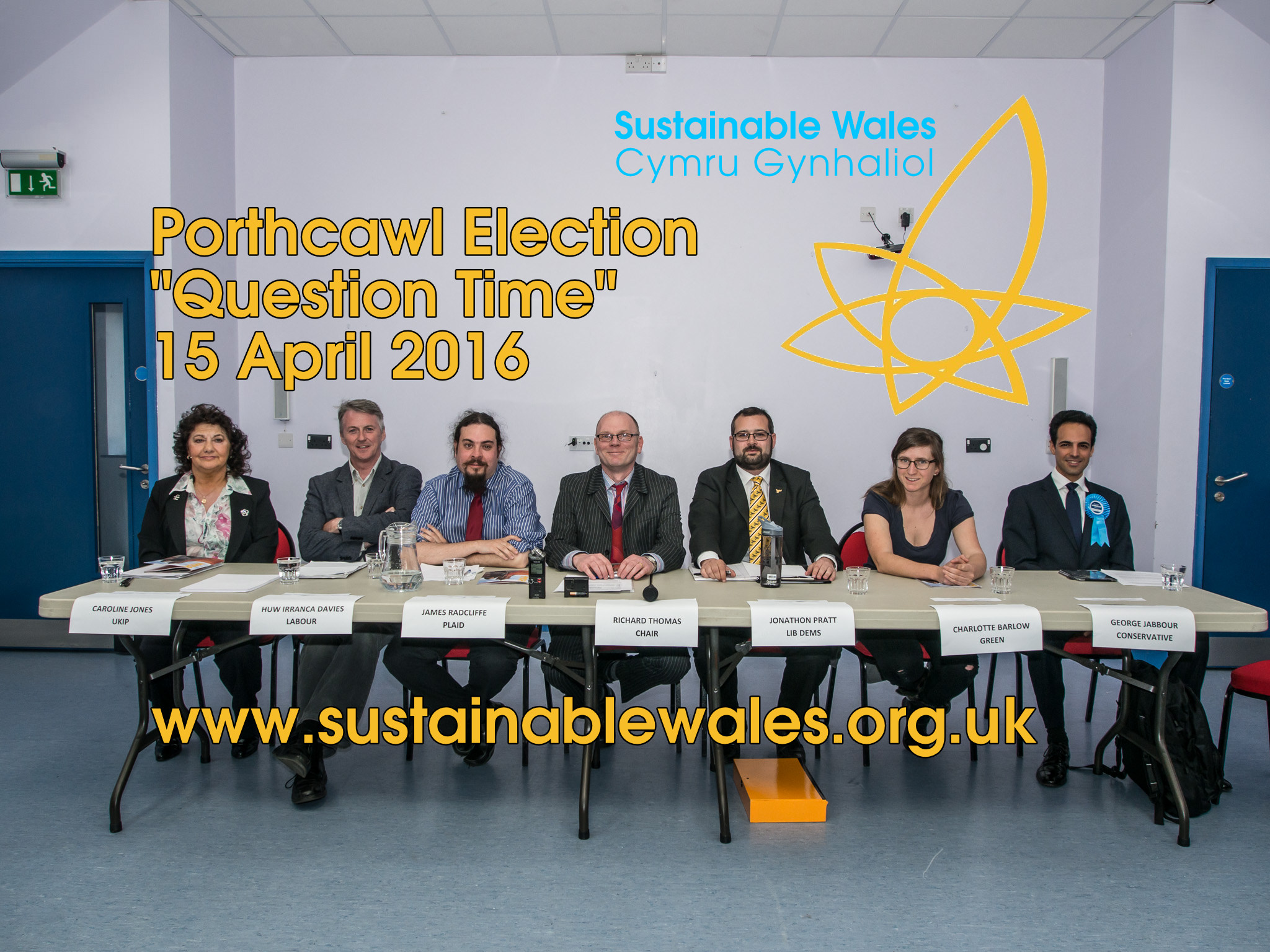
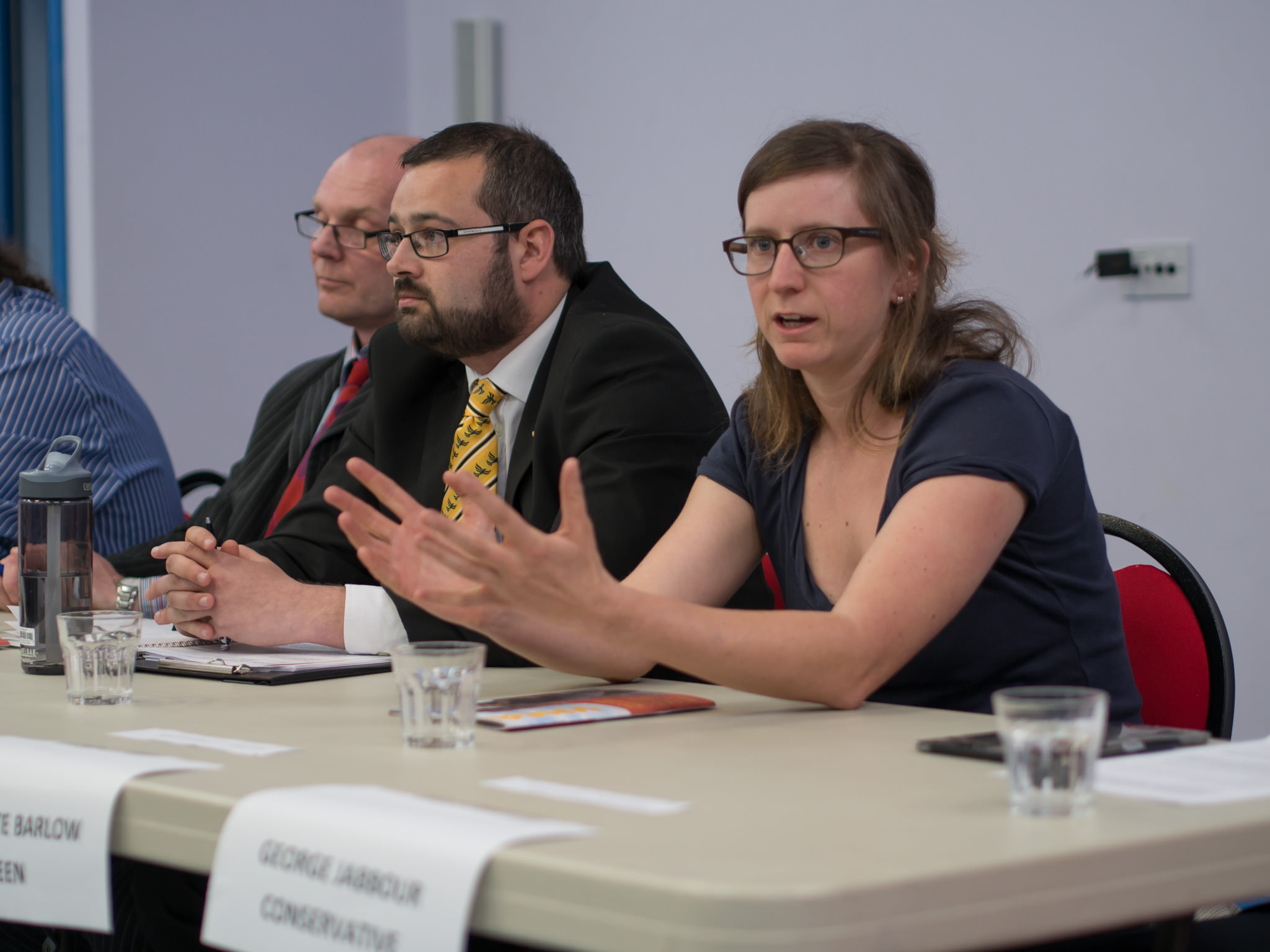
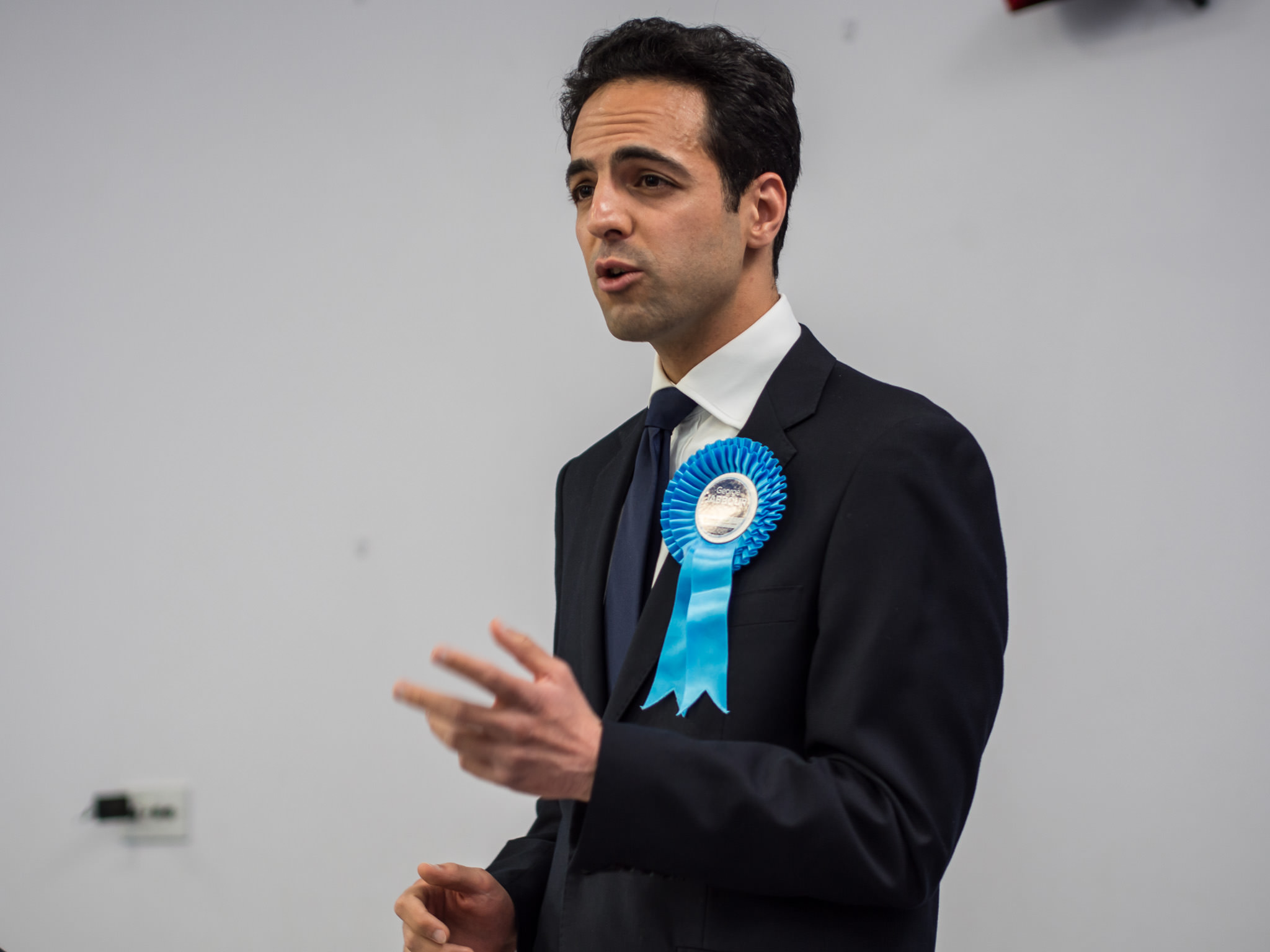
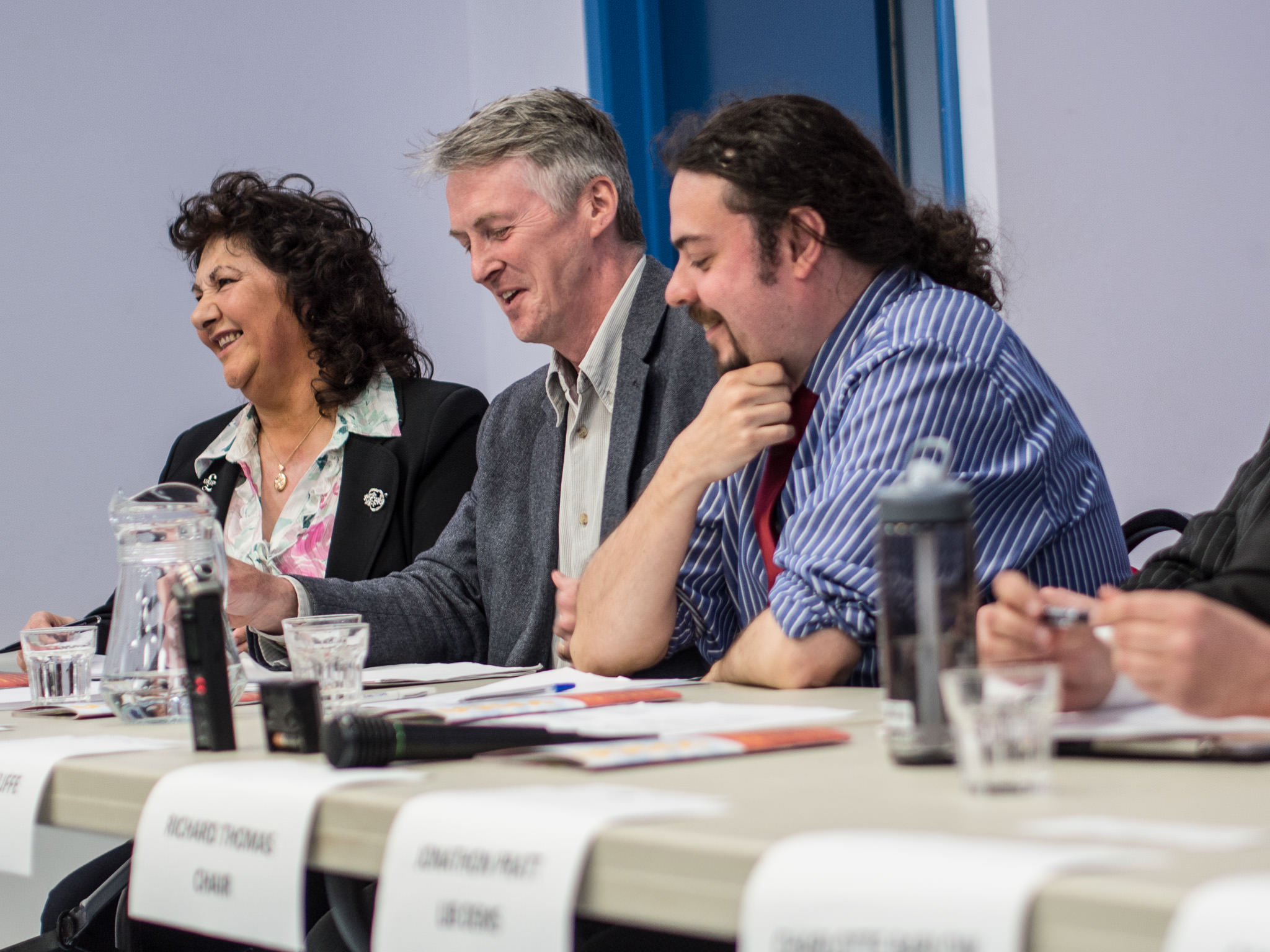
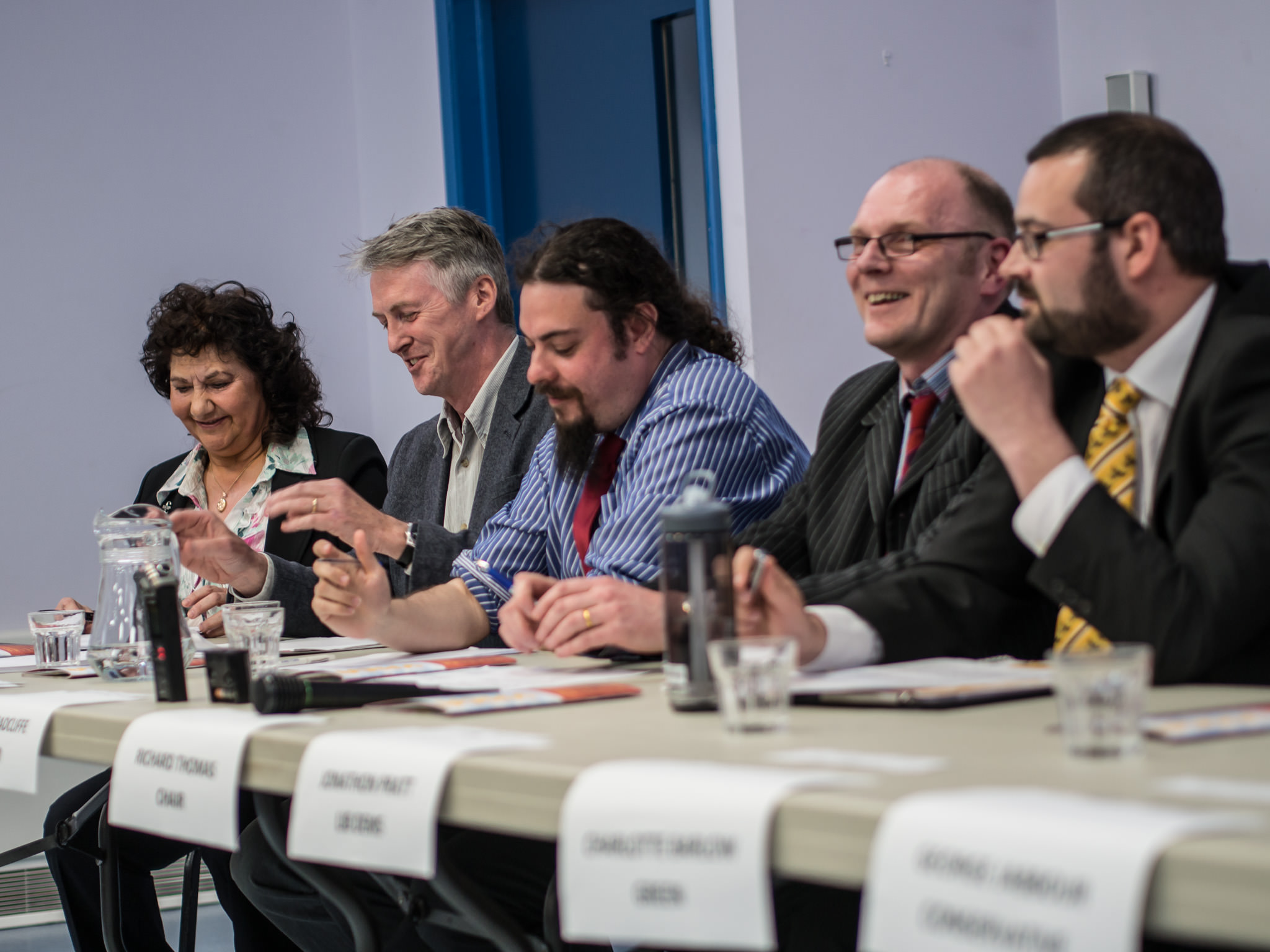
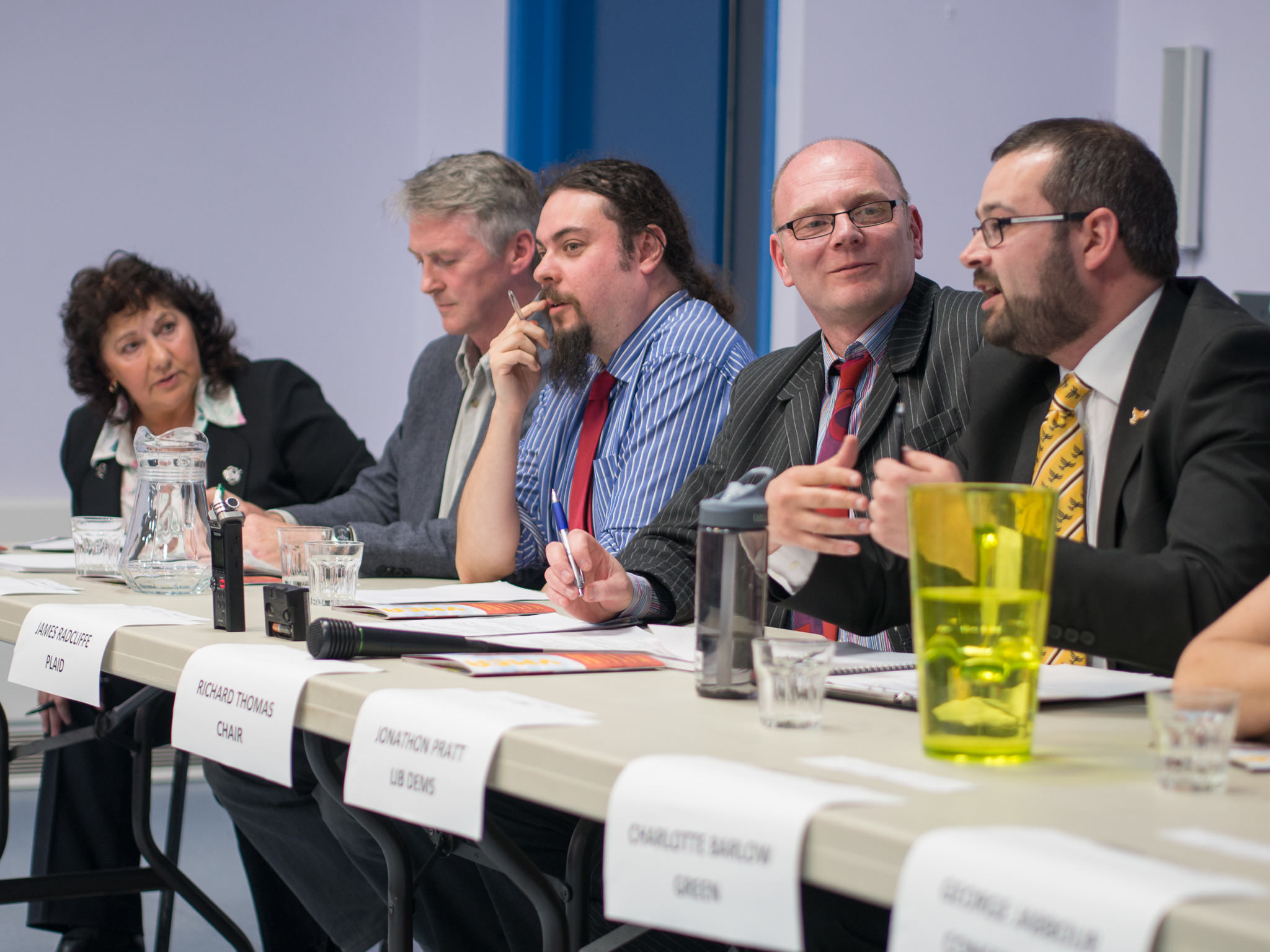
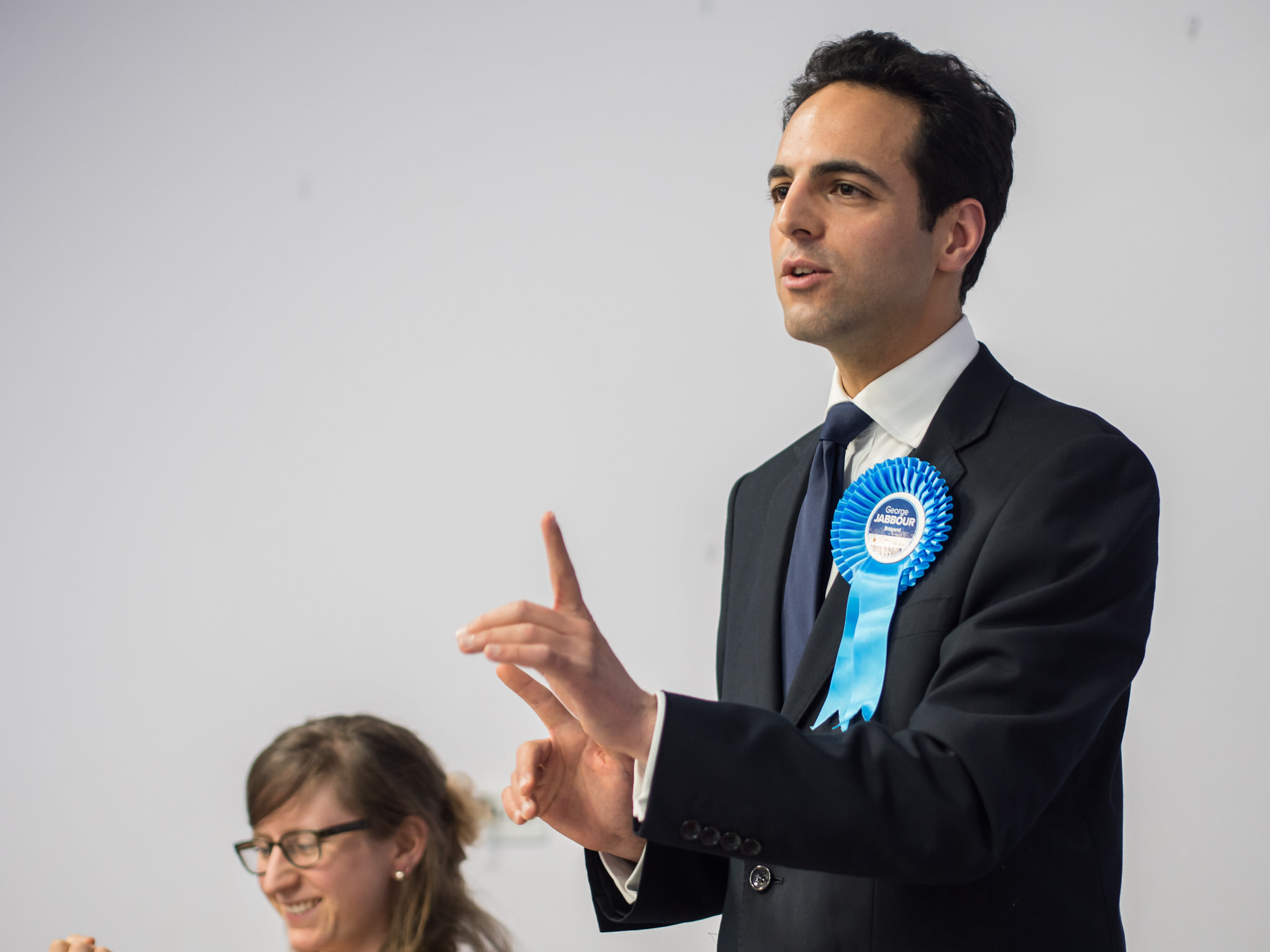
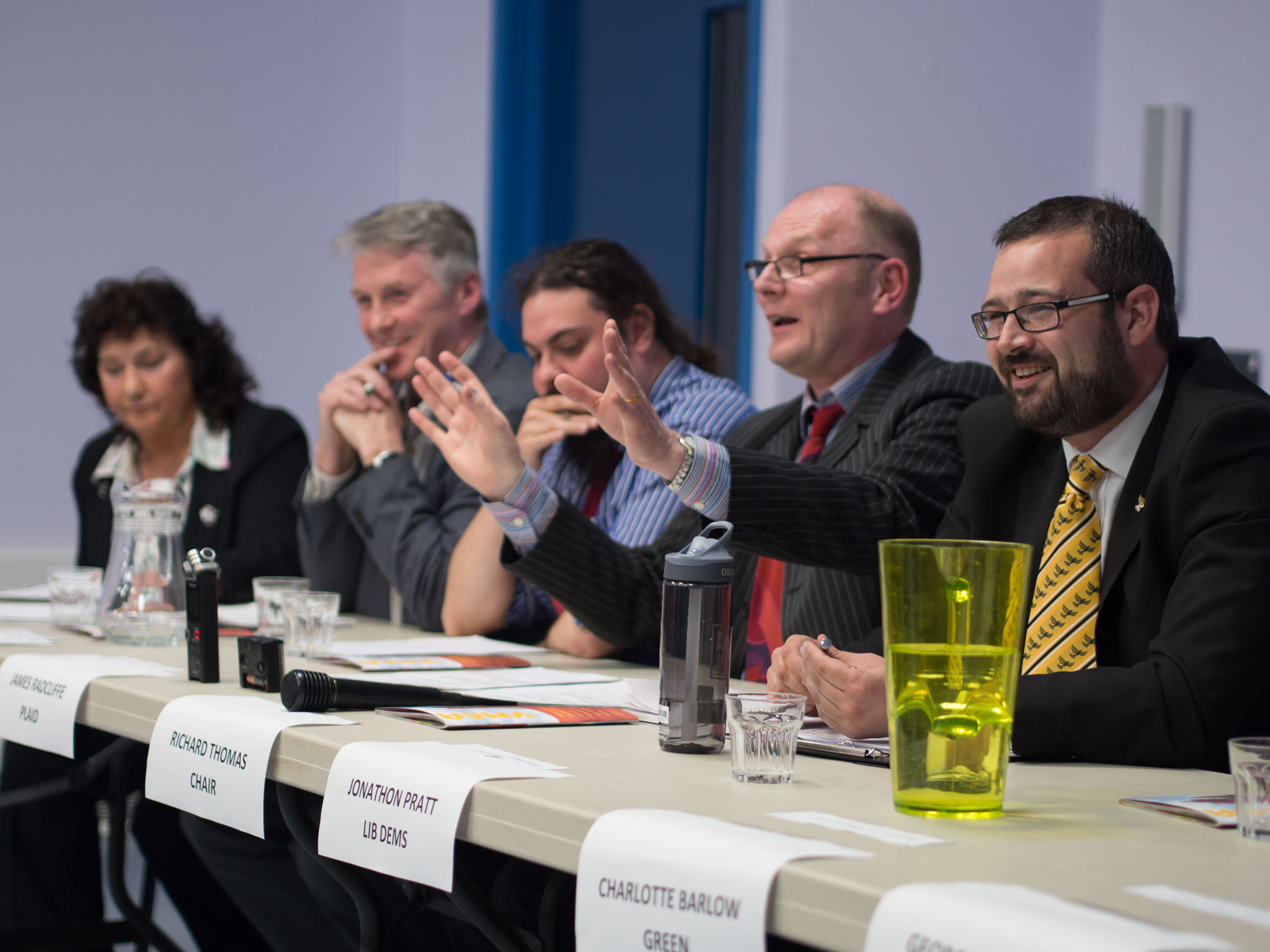
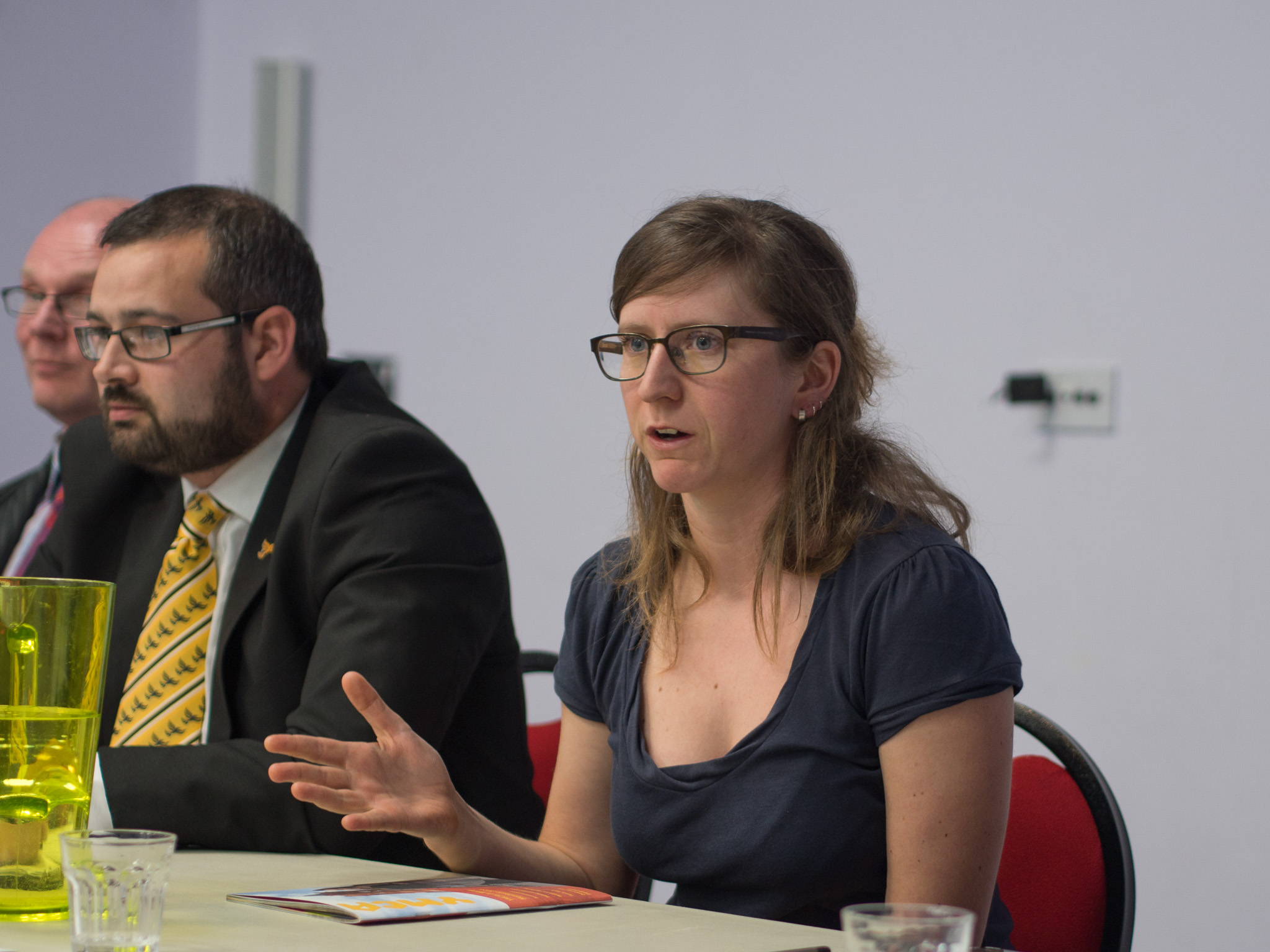
Your questions wanted for Election Question Time event in Porthcawl
Sustainable Wales is organising an election Question Time to take place in the Y Centre, YMCA, 25, John St., Porthcawl, 7pm – 9.30pm, FRIDAY, APRIL 15. See our events section for more details.
Questions are to be sent beforehand to the charity.
A spokesperson explained: “Questions on urgent local issues like the regeneration of Porthcawl are particularly welcome. Others might include re-instatement of a rail link, climate change, fracking and fuel poverty.
“But we feel the coming referendum on EU membership is almost certain to arise.
“Questions about local car parking will not be asked on the night.
“Questions must be self-explanatory and straightforward. They should be e mailed to robert.minhinnick@sustainablewales.org.uk by WEDNESDAY, APRIL 13.
“They should include the questioner’s name and address. Chairman on the night, Richard Thomas, will consider their suitability.”
Invited to take part are all the candidates in the BRIDGEND constituency.
Chairman on the night will be Richard Thomas, Chair of Sustainable Wales.
Sustainable Wales 01656 783962 / 773627.
BRIDGEND ELECTION CANDIDATES URGED TO CHAT OVER A CUPPA
George Jabbour, Conservative candidate for Bridgend at the Senedd May 5 election, is the first electoral hopeful to visit Sustainable Wales’s ‘SUSSED’ shop in Porthcawl.
George Jabbour & Margaret Minhinnick discussing fairtrade SUSSED
Director, Margaret Minhinnick said: “All candidates, from Green to UKIP, Labour or other parties are urged to visit SUSSED, a community enterprise that specializes in local, organic and fairly traded goods.
“We are delighted that George Jabbour has called in, and urge the others to do so by May 5. (See photo attached)
“George is supportive of Fair Trade, and was pleased to help celebrate 'Fair Trade Fortnight’, which ends on March 13. Mr Jabbour also purchased another pair of the shop’s unique bamboo socks, already an E Bay bestseller across the UK”
George Jabbour, who is facing First Minister Carwyn Jones in the election this May, commented “I also attended the Fairtrade Breakfast at Trinity Church in Porthcawl. The breakfast was organised by Porthcawl Fairtrade Town Partnership. The event which took place last Saturday (5th March) morning was very successful with many local people participating”.
“As a community, it is important we support local enterprises and champion fair trading as this will bring more prosperity to everyone: the producers, the retailers and the consumers.”
Margaret Minhinnick added: “Community enterprise creates local jobs and enhances distinctiveness. Thus I challenge all the other candidates to pop in, share a cup of fair trade tea or coffee and convince our volunteers why we should vote for their party.”
More information: Margaret Minhinnick 01656 783962 / 773627
